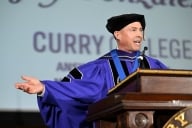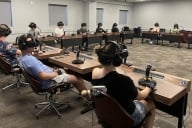You have /5 articles left.
Sign up for a free account or log in.
A major force in the higher education technology and learning space has quietly begun working with a major corporate force in -- well, in almost everything else.
Candace Thille, a pioneer in learning science and open educational delivery, has taken a leave of absence from Stanford University for a position at Amazon, the massive (and getting bigger by the day) retailer.
Thille’s title, as confirmed by an Amazon spokeswoman: director of learning science and engineering. In that capacity, the spokeswoman said, Thille will work “with our Global Learning Development Team to scale and innovate workplace learning at Amazon.”
No further details were forthcoming, and Thille herself said she was "taking time away" from Stanford to work on a project she was "not really at liberty to discuss."
Because so little information is available about what Thille will be doing, it's dangerous to speculate too much about what she and Amazon are up to. But her move is noteworthy for several reasons.
First, Thille is extremely influential. As founding director of the Open Learning Initiative at Carnegie Mellon University (part of which shifted to Stanford when she went to the left coast in 2013, a move Inside Higher Ed profiled), she has done groundbreaking work on using cognitive science and rich data on how students learn to try to transform the teaching and learning process.
In her vision, as laid out in a chapter she co-wrote in Educause's 2012 book Game Changers, transforming instruction and instructional technology development from a "solo sport to a community-based research activity" (a concept she attributes to her late colleague Herbert Simon) has the potential not just to improve learning, but also to improve colleges' productivity and drive down costs.
The Open Learning Initiative has used its existing open courses to help liberal arts colleges better educate academically underprepared students or free up classroom time for other purposes, and is developing a set of courses specifically for use by community colleges.
Amazon's Goals
For those who know Thille primarily from her work in higher education and open learning, her decision to take a job at Amazon may seem like a major transition.
But Thille is just as comfortable in a corporate setting as an academic one; she spent the first 18 years of her career at a consulting firm focused on "collaborative change" and workplace learning.
She also is not an academic (no Ph.D., and the assistant professor role she gained at Stanford was her first-ever faculty appointment) and has been known to bristle at the slow pace of change inherent at institutions (like Carnegie Mellon and Stanford) where tenured professors largely run the show.
Several observers of the education-technology landscape said they were unsurprised that a company like Amazon, whose business depends heavily on data analytics and near-constant experimentation, would turn to a high-profile learning scientist to help it improve how it trains employees.
"Amazon is experimenting with new ways to offer products and services five times a day in different places around the world," said Louis Soares, vice president for policy research and strategy at the American Council on Education. "You need learning [for employees] that keeps up with it, almost in real time." It's hard to imagine anybody better than Thille to attack a problem like that, he said.
Less clear to some observers was what drew Thille to Amazon, other than the obvious: the chance to get an inside look at what's happening in one of the world's most dynamic organizations.
Some interpreted her move as a signal that corporate learning is where most of the action is right now in the ed-tech and digital learning space, and that Thille may feel she can more readily achieve her goals of building out new models for learning in a sector not constrained by shared governance and what many feel is a fair bit of complacency.
Amazon has a history of investing heavily to produce its own top-notch internal technologies, and if Thille can in 18 months help Amazon create a path-setting adaptive system for employee learning, say, the implications could extend far beyond the company.
(And while working for a single company might seem like a narrowing of Thille's focus, Amazon's work force soared over the half million mark last fall -- not a paltry number.)
Promise and Peril
There is one more interesting aspect to Thille's move.
In recent years she has expressed increasing concern about the growing influence of the commercial sector in owning the data around student learning.
In a speech to alumni at Stanford's homecoming last fall, Thille gave a 101-level description of her work and vision, and added what has become a cautionary note amid her overall excitement about the promise of what she calls "technology-mediated learning environments," in which "every interaction the student makes is a piece of evidence about their learning."
This is a realm in which higher education is following in the lead, Thille said, of big corporate players -- like Google, Netflix and, yes, Amazon -- that have created interfaces that capture lots of data about us so they can "understand us better as consumers" and "know better what to target to us," individually and collectively.
She and other educators have much to learn from those companies about how to gather important data, which can be used, she said, to understand students not as consumers, but as learners. "We can use that data we collect and model it to give really important feedback … to the human actors in the educational system" -- just-in-time targeted feedback to learners themselves, information about students' strengths and weaknesses for faculty members, and data about where students stumble for the design teams that build these environments.
And the data can give scholars what they need to "feed our science" as learning researchers, Thille said.
The Downsides
She acknowledged, though, that many faculty members and others "fear" this vision -- "with good reason," she said.
"Because right now, many of the systems and coursewares that are being developed to support learning, we’re outsourcing to the commercial sector," Thille said, referring to the many textbook publishers and adaptive learning companies that are building platforms colleges are using to deliver instruction.
"All of those decisions that are being made every time we collect a piece of evidence and use that to make a recommendation to a learner or make a recommendation to the instructor. If we don’t know how the recommendations are being built, and the systems are just saying, 'Trust us, it works,' I would posit to you that that’s alchemy -- it’s no longer science."
Educators must insist, Thille continued, "that as we’re building this new model of education, the algorithms, the features, the representations [made to students and instructors] be open, be peer reviewable, be challengeable."
Her skepticism about higher education's outsourcing of technology to the corporate sector is not necessarily in conflict with Thille's decision to work at Amazon, of course. Amazon isn't (currently, at least) producing the kind of proprietary educational software that Thille warns about, so the knowledge and expertise she brings to the company won't contribute to the problem she cites.
A stint at Amazon -- building, presumably, internal software to help the company train its own workers -- could, though, conceivably give her the kind of insights about using data to understand behavior that she described in her Stanford speech.









